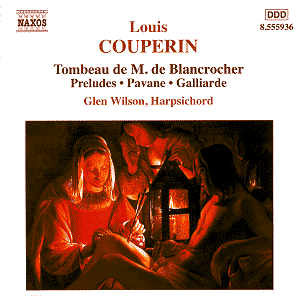Louis Couperinís small corpus of surviving works is
contained in two anthologies of his music grouped together in keys.
Each of the groupings begins with a Prelude - some of the more extensive
preludes have an independent place in the anthologies. As harpsichordist
Glen Wilson writes in his notes the idea that these are in any real
sense "suites" is an anachronism. The dance movements that
became codified in later generations were as yet unordered in Couperinís
day, the player being free to select from the various available movements.
Glen Wilson plays a copy of a 1628 Ruckers, recorded
in the Schutt-Bau in Hofheim-Rügheim, Lower Franconia. He has also,
I notice, edited the Sixteen Préludes non mesurés
for Breitkopf & Härtel and plays here with imaginative flair
and a real insight into the notorious problem of Couperinís free rhythm
Preludes, the most concentratedly problematical aspect of his compositions.
With its spatial and lateral depth the Prelude in D, with its listless,
almost proto-romantic freedom could otherwise buckle into formlessness.
Wilson however without stressing the metrical aspect keeps tension through
control whilst giving free rein to the profoundly expressive material
(notated in whole notes without barlines). Admirable as well is the
complex seriousness he evokes in the Allemande in D and the acerbically
dramatic Gigue in the same set. He gives real rhythmic life to the Prelude
after Froberger and in the Prelude in F major he finds a
just balance between sternness and affection. There is even greater
gravity and weight in the Tombeau de M de Blancrocher,
in F major, which Wilson plays with eloquent beauty, with its baleful
bass interruptions giving notice of the saturnine and invincible forces
ranged against life and an occasional obsessive concentration on its
material.
Wilson is fine in the Courante - one of the pieces
in G minor Ė where he galvanizes the rhythm whilst the right hand voicings,
full of grandeur and nobility, course through the splendid Passacaille
and sounding Handelian avant la lettre. The freedom encouraged by the
preludes Ė for example the rather shorter one in C Ė is not, in Wilsonís
hands, at the expense of rhythmic rectitude. Stylish gravity is mined
in that setís Courante and the crossed hands Courante that follows,
with its rhythmic pitfalls and delicate filigree is negotiated with
panache. Itís clear that Wilson doesnít abjure dynamic variance Ė listen
to the shadings in the Rigaudon and Double and his F sharp minor Prelude
is freighted with tangible depth. The long Prelude (Toccade) in D minor
illustrates flexibility of metre and a potentially discursive freedom
without ever losing shape. This most enjoyable recital ends with the
directness and simplicity of the Galliarde Ė an affirmative and joyful
way to bid adieu to Couperin and to Glen Wilson and this enterprisingly
sensitive disc.
Jonathan Woolf

